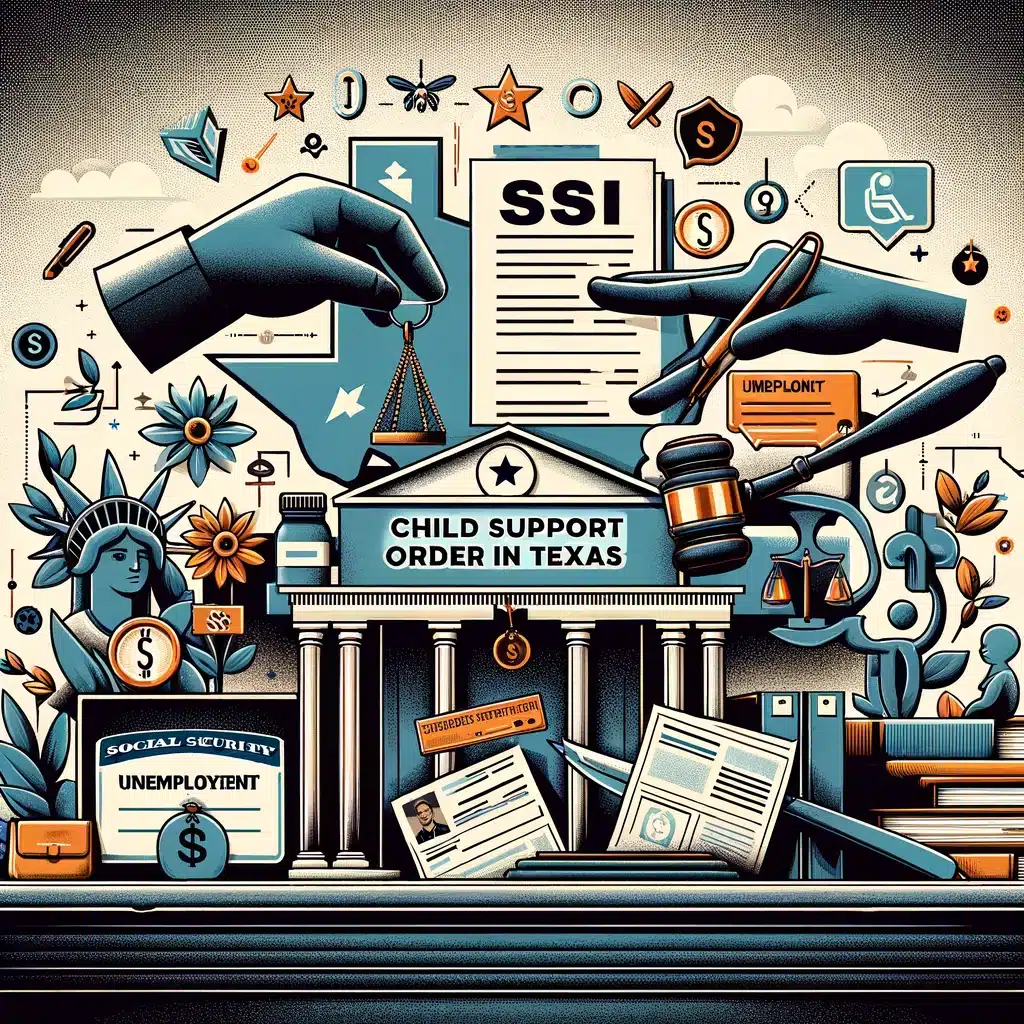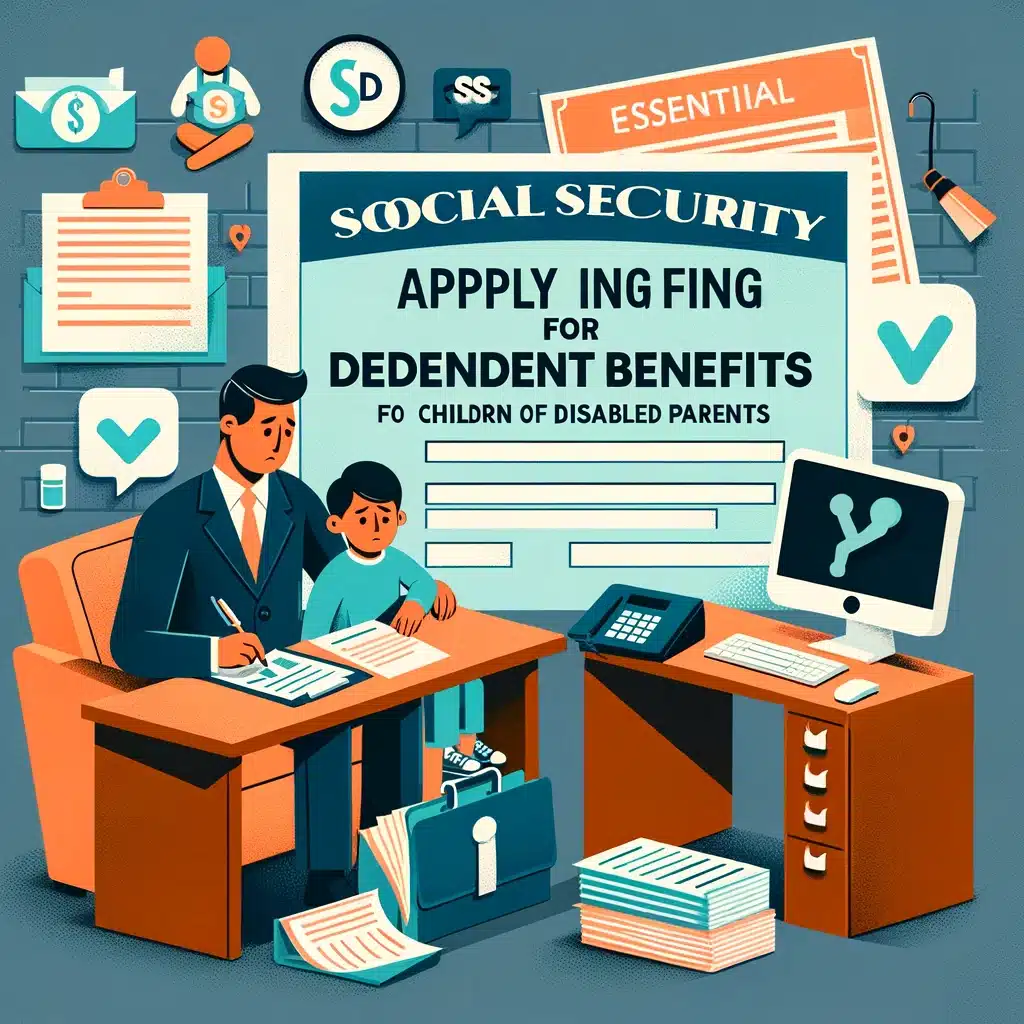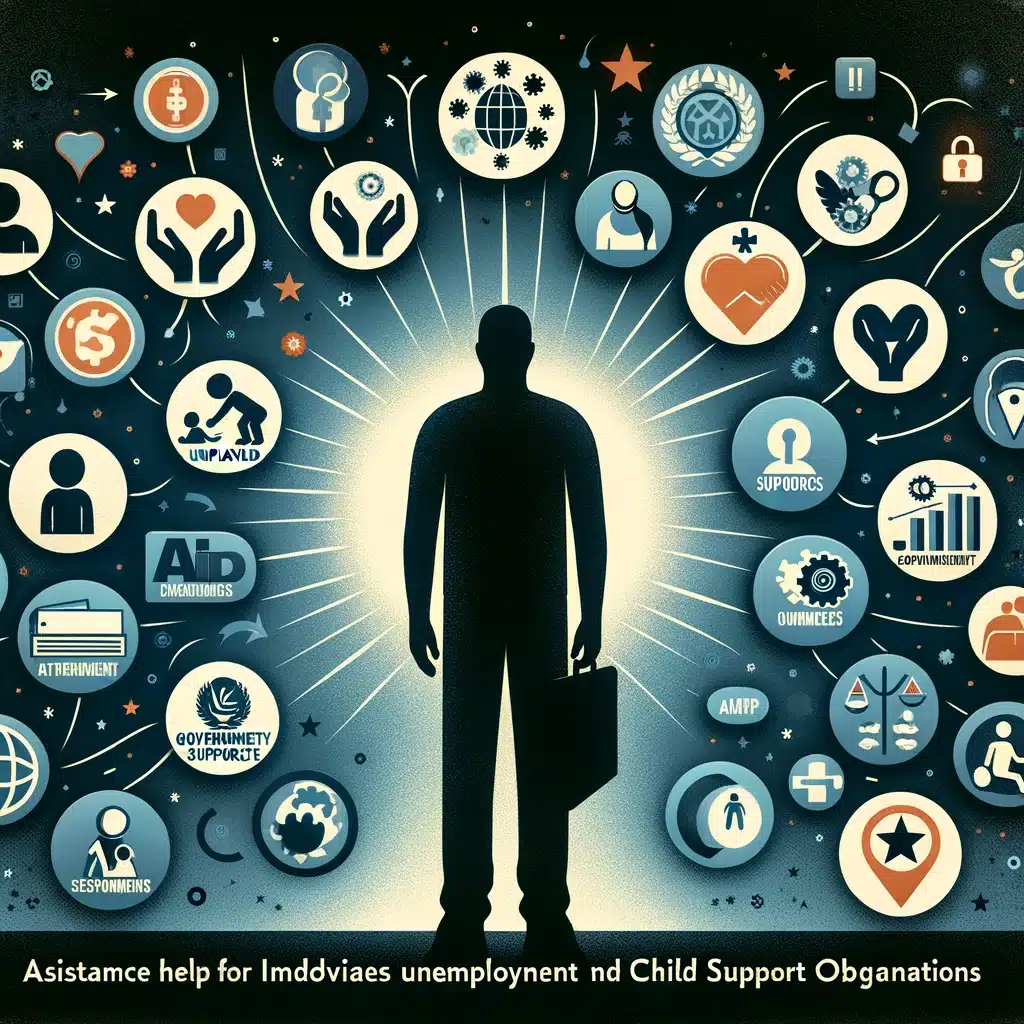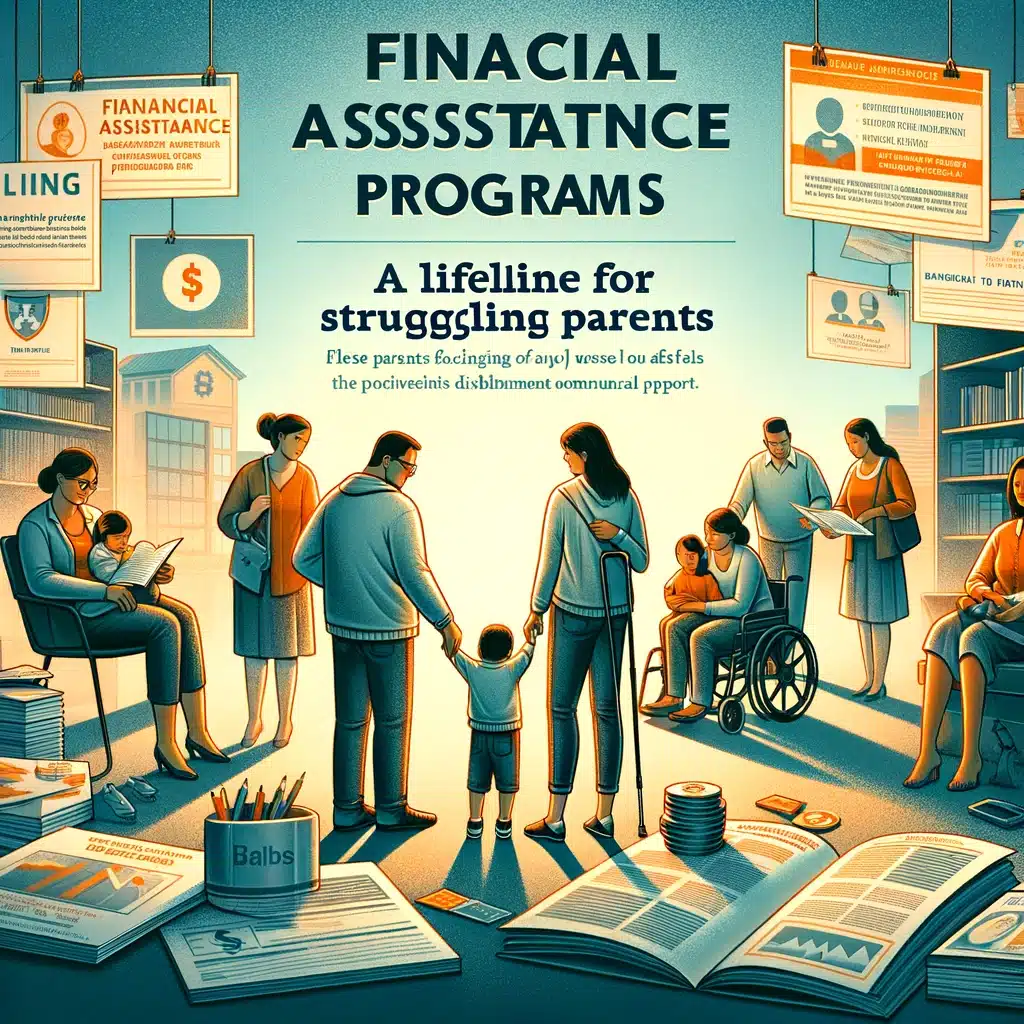Picture this: You’re juggling life’s daily challenges with the grace of a tightrope walker. Bills to pay, errands to run, and, oh yes, the kids’ never-ending appetite for pizza. Just when you thought you had it all under control, a curveball comes hurtling your way. That curveball? It’s called “disability and child support,” and it’s a topic that can make even the most organized among us feel like we’re trying to untangle a spaghetti knot in the dark.
But don’t fret! In this blog, we’re diving headfirst into the intriguing world of “disability and child support” (or should we say, the rollercoaster ride of life and financial responsibilities). So, if you’re wondering whether child support is affected when a parent goes on disability or if disability benefits can be a lifeline for your children, you’re in the right place.
Short Answer: Yes, disability can indeed impact child support, and there’s a lot to uncover about how these two dance together. So, grab your popcorn (or pizza, if that’s more your style) because we’re about to unravel the mysteries, challenges, and solutions in the fascinating realm of disability and child support!

Optimizing Child Support in Situations Involving Disability: Navigating the Complexities
Introduction to Child Support and Disability Considerations
In family law cases, particularly those involving divorce or child custody, the issue of child support invariably emerges as a central concern. It’s the primary financial link between ex-spouses post-divorce, often leading to tensions, especially when perceptions of mismanagement arise. This complexity intensifies in cases where disability factors into child support considerations, raising unique challenges and questions.
Understanding Child Support Dynamics in Custody and Divorce
Child custody cases share the child support complexities of divorce scenarios. For example, instances where parents have informally provided substantial support prior to legal proceedings can lead to frustrations when formal child support orders demand even more. This section will explore how these situations are handled, especially when one parent or the child has a disability.
Child Support Calculation: The Role of Net Monthly Income
Texas family code provides clear guidelines on calculating child support, predominantly based on the payer’s net monthly income and the number of children involved. Here, we’ll delve into how disability and child support intertwine in these calculations, affecting both the amount and the distribution of support.
Determining Net Monthly Income for Child Support
This section will guide you through understanding net monthly income – a crucial factor in calculating child support. We’ll discuss the inclusion of various income sources and how expenses, especially those related to disability, might impact the final child support figure.
Special Considerations for Children with Disabilities
Children with disabilities often incur additional educational, medical, or mental health expenses. We’ll examine how child support calculations adapt to these increased needs, ensuring fair and adequate support for the child’s well-being.
Real-World Applications: Understanding Average Child Support Payments
Using real-case examples, this part will give readers an idea of the typical range for child support payments, factoring in average salaries and family sizes. We’ll also discuss how unique circumstances, particularly those involving disabilities, might lead to deviations from these averages.
Navigating Child Support with Professional Guidance
Concluding, we’ll emphasize the importance of consulting with a legal expert, especially in complex cases involving disability. This professional advice is vital for understanding obligations, rights, and the nuances of child support in such scenarios.
Navigating Child Support Payments During Unemployment: Disability and Child Support Considerations
The Impact of Job Loss on Child Support Obligations
In the wake of the pandemic, many individuals, possibly in sectors like entertainment, hospitality, or oil and gas, are grappling with job loss and financial instability. This situation raises a critical question: if you are not working, do you still have to pay child support? This section will address the obligations and challenges of maintaining child support payments during periods of unemployment, particularly when disability and child support are intertwined.

Child Support and Disability: Understanding Your Obligations Without Income
Even in the absence of income, the responsibility to pay child support persists. This holds true regardless of whether you’re initiating divorce proceedings or already have child support orders in place. Here, we’ll discuss how courts typically handle child support calculations in such situations, emphasizing the nuances when dealing with disability and child support.
Strategies for Managing Child Support Payments Amid Financial Hardship
Losing a job, especially during a pandemic, can be a significant source of stress and uncertainty. We’ll explore practical strategies for addressing child support commitments in these challenging times. This includes seeking employment in different fields, considering part-time jobs, or even gig economy opportunities, with a focus on how these choices interact with obligations related to child support and disability.
Communicating with Your Ex-Spouse: Approaching Child Support Discussions
Effective communication with your ex-spouse is crucial in navigating child support issues during periods of unemployment. We’ll provide guidance on how to approach these conversations constructively, aiming to find amicable solutions that consider both parties’ circumstances, including aspects related to disability and child support.
Seeking Legal Advice: Understanding Your Rights and Options
Finally, this section emphasizes the importance of seeking legal counsel in complex child support cases, especially where disability is a factor. Legal advice can provide clarity on your rights, options, and potential avenues for renegotiating child support terms in light of your current financial situation.
Understanding Child Support and Disability: Social Security Disability Insurance Considerations
The Intersection of Disability and Child Support in Social Security Cases
If you’re navigating the process of obtaining Social Security Disability Insurance (SSDI), it’s important to understand how this impacts child support obligations. This section explores the journey through the lengthy process of SSDI application and approval, and the implications for child support in cases involving disability.

Do SSDI Recipients Have Child Support Obligations?
Once approved for Social Security disability insurance, the question arises: does this count as income for child support purposes? We delve into whether SSDI payments, which are based on your work history, are considered income that can be used to calculate child support payments, highlighting the interplay between disability and child support.
The Role of SSDI in Calculating Child Support
For parents approved for SSDI, understanding how these benefits affect child support payments is crucial. This section discusses how SSDI is considered as income in family courts in Texas, and the necessity of applying for dependent benefits for your children to ensure that these are factored into child support calculations.
Maximizing Government Benefits for Child Support Calculation
It’s essential to set up government benefits for your children promptly, particularly in the context of ongoing family law cases. We will guide you through the process of establishing these benefits to ensure they are credited towards your child support obligations, emphasizing the role of disability and child support in this context.
Navigating SSDI and Child Support with Legal Assistance
Given the complexity and time-intensive nature of obtaining SSDI and its implications for child support, the support of an experienced attorney is invaluable. We’ll explain why professional legal guidance is recommended in these situations, particularly in Southeast Texas, to ensure that your SSDI is accurately reflected in your child support calculations.
Child Support and Disability: Understanding Your Rights When the Father is on SSI
Overview of Child Support and SSI in Texas
Navigating child support when the other parent receives Supplemental Security Income (SSI) in Texas can be complex. This article aims to clarify the entitlements and obligations regarding child support in situations where the father is on SSI. Understanding the legal landscape in these scenarios is crucial for ensuring that children’s financial needs are adequately addressed.

Legal Framework for Child Support in Texas: Considering SSI
In Texas, the obligation to provide child support is a fundamental component of family law. This responsibility persists irrespective of the parent’s financial status, including cases where a parent receives SSI. It’s essential to recognize that child support determinations are multifaceted and the unique circumstances of each case, such as disability and child support considerations, play a significant role in the decision-making process.
Determining Child Support: Balancing SSI and Financial Responsibilities
The calculation of child support in Texas takes into account various elements, notably the income of the noncustodial parent, which in this context includes SSI benefits. Courts adhere to the Texas family code, which prescribes the proportion of net monthly income, including SSI, to be dedicated to child support. This amount is adjusted based on the number of children, with a cap set at 50% of the net income for child support purposes.
Implications of SSI on Child Support Payments
Receiving SSI can impact the calculation of child support payments. Since SSI is designed to support individuals with limited income and resources, this may affect the amount of child support that can be realistically provided. The article will delve into how Texas courts approach these situations, balancing the financial limitations of a parent on SSI with the needs of the child, emphasizing the interplay between disability and child support.
Adjusting Child Support Orders in Texas: The Role of SSI and Unemployment
Modification Process for Child Support Orders in Texas
In Texas, child support orders can be modified to reflect significant changes in a parent’s financial situation, including cases where the father begins receiving SSI. Understanding the correct legal procedures for modifying child support is essential. This section will guide you through the process and highlight the importance of consulting with a legal expert, especially in situations involving disability and child support considerations.

Enforcement of Child Support in Texas: Dealing with Non-Compliance
The enforcement of child support orders is a key issue for custodial parents. Texas has several mechanisms to ensure compliance, ranging from wage garnishment to more severe actions like driver’s license suspension or even imprisonment. Here, we’ll explore these enforcement measures and their implications, particularly in cases where the noncustodial parent is on SSI or facing financial hardships.
Child Support Obligations Amidst Unemployment
Unemployment or a significant drop in income does not automatically exempt a parent from child support responsibilities. The Texas legal system requires noncustodial parents to maintain their child support obligations according to their current financial situation. This section will discuss the importance of promptly notifying the court about any changes in employment status and seeking a modification of the child support order, especially when disability and child support are relevant factors.
Navigating Child Support for Special Needs Children in Texas
Enhanced Child Support for Special Needs Children
In Texas, the court acknowledges that children with special needs may require additional financial resources. This can be due to increased medical, educational, or care-related expenses that go beyond those of typical children. The legal system, therefore, allows for an adjustment in child support payments to adequately support the unique needs of these children. It’s crucial for parents to provide detailed evidence of these additional expenses to ensure a fair determination of child support obligations, particularly in cases where disability and child support are intertwined.
Special Needs Trusts: Understanding Their Role and Impact in Your Texas Divorce
Special Needs Trusts play a critical role in the financial planning and well-being of a disabled child, particularly in the context of a divorce in Texas. These trusts are designed to provide for the extra and supplemental needs of a disabled individual without disqualifying them from eligibility for public assistance benefits like Medicaid or Supplemental Security Income (SSI).
In a Texas divorce scenario, establishing a Special Needs Trust can be a strategic way to ensure that the child’s future financial needs are met without jeopardizing their eligibility for essential government benefits. The trust can be funded with child support payments, settlements, or other financial sources. It’s managed by a trustee who disburses funds for the child’s benefit, ensuring that the child’s disability-related expenses are covered without affecting their government aid.
Understanding how to properly set up and manage a Special Needs Trust, as well as its implications in a divorce settlement, is crucial. It not only safeguards the financial security of the disabled child but also ensures that both parents fulfill their parental responsibilities in a way that best serves the child’s long-term interests. Legal guidance is often necessary to navigate these complexities effectively.

Accurate Calculation of Net Monthly Income for Child Support
A key aspect of determining child support in Texas is calculating the noncustodial parent’s net monthly income. This includes income from employment minus taxes and other standard deductions. Additionally, income from other sources like investments, real estate, or stocks also plays a role in this calculation. Understanding and applying the guidelines set out in the Texas family code is essential for an accurate assessment of net monthly income, especially in scenarios involving special needs children and additional expenses related to disability and child support.
| Number of Children | Percentage of Net Monthly Income |
| 1 | 20% |
| 2 | 25% |
| 3 | 30% |
| 4 | 35% |
| 5 or more | 40% |
Determining Minimum Wage as Net Monthly Income for Child Support
In cases where the noncustodial parent is unemployed or earning below minimum wage, the court may assume a net monthly income equivalent to minimum wage for child support calculations. This ensures that some financial responsibility is still allocated to the parent, even if their income is limited.
Child Support Payment Plans and Negotiations
When facing challenging financial circumstances, open communication with the ex-spouse is crucial. Discussing the situation and potential options for payment plans or modifications can help both parties find a mutually agreeable solution. It’s recommended to seek legal advice and involve attorneys early in the process to ensure that your rights and obligations are protected.

Communication Strategies with Ex-Spouse Regarding Child Support
Engaging in direct and respectful communication with the ex-spouse is essential when discussing child support matters. Explaining your financial situation and exploring possibilities for temporary adjustments or modifications can foster understanding and cooperation. Keeping the lines of communication open helps both parents work together for the best interests of their children.
Consequences of Failure to Pay Child Support in Texas
Failure to pay child support can lead to severe consequences. As mentioned earlier, enforcement measures such as wage garnishment, license suspension, or even imprisonment may be imposed on noncustodial parents who neglect their child support obligations. It’s important to prioritize these payments to avoid legal repercussions and maintain a healthy parent-child relationship.
Child Support Obligations and Social Security Disability Insurance
In the context of divorce and child support, a key question often arises: “Will your child be able to receive Social Security Disability Insurance (SSDI) and Child Support after a divorce, especially if the noncustodial parent is on SSI?” The answer is affirmative. SSDI benefits are categorized as income under child support laws and thus can be factored into child support calculations. Additionally, children of a noncustodial parent who receives SSDI are potentially eligible for dependent benefits. It is vital to apply for these benefits in a timely manner to secure the financial support your children are entitled to, especially in cases where one parent is receiving SSI.
Applying for Dependent Benefits for Children of Disabled Parents
If the noncustodial parent is receiving SSDI, their children may qualify for dependent benefits through Social Security. To apply for these benefits, it’s essential to follow the appropriate procedures and communicate with the Social Security Administration to ensure your children receive the support they deserve. Seeking guidance from professionals or an attorney can help navigate this process effectively.

Establishing Children’s Benefits through Social Security
To receive credit for the support your children receive through Social Security, it’s crucial to set up the benefits as soon as possible. Waiting until after the family law case is concluded may result in missed opportunities. By establishing the benefits during the legal proceedings, you ensure that your children’s needs are met, and the court recognizes the support they receive.
Role of Attorneys in Child Support Cases in Texas
Navigating child support cases, especially when complex factors like disability benefits are involved, can be overwhelming. Attorneys specializing in family law can provide valuable guidance, ensuring that your rights are protected, and the best interests of your children are met. They can assist in calculating child support, negotiating payment plans, and handling any modifications or enforcement actions that may arise.
Process and Timeline for Applying for Social Security Disability Insurance
Applying for Social Security Disability Insurance can be a lengthy process, often involving multiple applications and hearings. It requires persistence and patience to navigate the system successfully. Seeking assistance from professionals or disability attorneys who are experienced in this field can greatly improve your chances of a successful application.
Assistance Programs for Individuals Facing Unemployment and Child Support Obligations
If you find yourself facing unemployment and struggling to meet your child support obligations, it’s essential to explore available assistance programs. Government and community resources can provide temporary relief and support during challenging times. Research local programs, consult with social workers, or reach out to organizations specializing in helping individuals in similar circumstances.

Budgeting and Financial Planning During Child Support Payments
Child support payments can significantly impact your finances, so it’s crucial to establish a budget and engage in financial planning. Prioritize essential expenses, seek ways to reduce costs, and explore additional income sources. Responsible financial management will help ensure that both your child support obligations and personal financial stability are maintained.
Child Support Guidelines and Deviations in Texas
While child support guidelines provide a framework for determining obligations, certain circumstances may warrant deviations from the standard calculations. Factors such as high-income earners or special needs children can influence the amount of child support awarded. Understanding the guidelines and the potential for deviations ensures a fair assessment of child support obligations in your specific case.
Divorcing in Texas? Know How to Protect Yourself and Your Family: Navigating Child Support and Disability
In the realm of family law in Texas, child support consistently stands out as a pivotal issue, especially during divorce and child custody cases. It often represents the most significant financial connection between separated spouses or parents. Understanding the influence of disability on child support arrangements is essential for anyone navigating these waters. This article aims to provide a thorough exploration of the interplay between disability and child support. We will delve into the processes and implications, offering insights and resources to assist individuals confronting these challenges, ensuring they are well-equipped to protect themselves and their families in the context of a Texas divorce.
How Much Child Support Can You Receive in Texas for a Disabled Child Over the Age of 18?
In Texas, child support for a disabled child over the age of 18 can vary based on several factors. Typically, child support for adult disabled children continues as long as the child requires substantial care and personal supervision due to a physical or mental disability and cannot self-support. The amount is determined by considering the child’s specific needs, the parent’s ability to pay, and the financial resources available for the care of the disabled child. It is vital to consult with a family law attorney to understand the specific guidelines and calculations for child support in these unique circumstances.
Child Support Modification
Understanding the Process
Child support orders are typically established based on a noncustodial parent’s income at the time of divorce or custody proceedings. However, life is unpredictable, and financial circumstances can change significantly, especially when disability strikes. When a noncustodial parent goes on disability or experiences a substantial decrease in income, modifying child support orders may become necessary.
Modifying child support involves a legal process that requires presenting evidence of the change in financial circumstances. It’s crucial to consult with an attorney to navigate this process successfully. Whether you’re the custodial or noncustodial parent, understanding the requirements and steps for modification is essential to ensure fair and equitable child support arrangements.

Impact of SSDI on Child Support Calculations
Decoding SSDI Benefits
Social Security Disability Insurance (SSDI) is a lifeline for individuals who suffer from severe disabilities, whether physical or mental. But how do SSDI benefits factor into child support calculations? Let’s break it down step by step.
When a noncustodial parent receives SSDI benefits, these benefits are considered income and can influence child support calculations. The amount of SSDI benefits received depends on the individual’s work history and earnings before becoming disabled. Understanding how these benefits are factored into child support calculations is crucial for both custodial and noncustodial parents.
Potential Adjustments
It’s essential to recognize that SSDI benefits are not a fixed amount; they vary based on the individual’s earnings history. Consequently, child support calculations may need to be adjusted periodically to reflect changes in SSDI benefits. These adjustments ensure that child support remains fair and in alignment with the noncustodial parent’s financial situation.
Dependent Benefits for Children
Extending Support to Children
One often overlooked aspect of SSDI is the opportunity for children to receive dependent benefits when a parent is on SSDI. This additional support can make a significant difference in the lives of children whose parents are disabled. But how does one go about applying for these benefits?
Applying for dependent benefits for your children involves navigating the Social Security Administration’s process. It’s important to inquire about the specific steps and requirements to ensure that your children receive the support they are entitled to. Don’t miss out on this valuable resource for your children’s well-being.

Enforcement Measures
Ensuring Compliance
Child support orders are legally binding, and both custodial and noncustodial parents have a responsibility to uphold them. However, there are instances where the noncustodial parent fails to make child support payments. In such cases, custodial parents can explore various enforcement measures to ensure compliance.
These measures may include wage garnishment, intercepting tax refunds, suspending driver’s licenses, and, in extreme cases, pursuing legal action that could lead to imprisonment. Understanding the enforcement options available is essential for custodial parents who rely on child support to meet their children’s needs.
Financial Assistance Programs
A Lifeline for Struggling Parents
Financial challenges can compound when a noncustodial parent faces disability or job loss. In these difficult times, government and community assistance programs can provide much-needed support. Whether you’re the custodial or noncustodial parent, exploring available assistance programs is a responsible step towards ensuring the well-being of your children.
Researching local programs, consulting with social workers, or reaching out to organizations specializing in helping individuals in similar circumstances can make a significant difference in navigating the financial challenges associated with child support obligations during disability.

Budgeting and Financial Planning
Managing Child Support Payments
Child support payments can significantly impact an individual’s finances, whether they are the custodial or noncustodial parent. Establishing a budget and engaging in financial planning is essential to ensure that child support obligations are met without jeopardizing one’s financial stability.
Prioritizing essential expenses, seeking ways to reduce costs, and exploring additional income sources are strategies that can help individuals effectively manage their finances while fulfilling their child support obligations.
Child Support Guidelines and Deviations
Tailoring Child Support to Unique Circumstances
Child support guidelines provide a framework for determining child support obligations. However, not all cases fit neatly within these guidelines. Certain circumstances, such as high-income earners or children with special needs, may warrant deviations from the standard calculations.
Understanding the guidelines and the potential for deviations ensures a fair assessment of child support obligations that takes into account the unique circumstances of each case. It’s important to work with legal professionals who can navigate these complexities.
Legal Representation
Safeguarding Your Rights
Navigating child support cases involving disability benefits can be intricate. Seeking legal representation from experienced family law attorneys is crucial to protect your rights and the best interests of your children. Whether you’re the custodial or noncustodial parent, having an attorney by your side ensures that you receive the guidance and support needed to navigate these complex legal matters successfully.

Local Resources
Community Support
Local resources, organizations, and social workers can play a vital role in assisting individuals dealing with child support issues, unemployment, or disability benefits. Connecting with these resources can provide valuable insights, support, and assistance during challenging times.
Conclusion
Child support and disability are complex issues that require careful consideration and navigation. Whether you’re a custodial or noncustodial parent, understanding the processes, implications, and available resources is essential to ensure that child support obligations are met while addressing the unique challenges posed by disability.
In this comprehensive article, we’ve explored child support modification, the impact of SSDI on child support calculations, dependent benefits for children, enforcement measures, financial assistance programs, pandemic-related job loss, budgeting and financial planning, child support guidelines and deviations, the importance of legal representation, and the value of local resources.
By arming yourself with knowledge and seeking the support of legal professionals and community resources, you can navigate the complex terrain of disability and child support, safeguarding the well-being of your children and your own financial stability. Remember, each case is unique, and seeking personalized advice and assistance is the key to addressing these challenges effectively.
Other Articles you may be interested in:
- Harris County’s Stay at home order does not affect exchanges of children
- Common Law Marriage and Texas Divorce Guide
- How to get a Common Law Divorce in Texas
- Can I sue my spouse’s mistress in Texas?
- Common Questions about Texas Prenuptial and Marital Agreements
- Can my ex get half of my VA disability? (and other military divorce questions)
- Military disability pay in a Texas divorce case
- How disability issues are handled during a military divorce in Texas
- Will your child be able to receive Social Security Disability Insurance and Child Support after a divorce?
- The impact of divorce on spouses who receive disability payments
- Common Law Marriage and Texas Divorce Guide
- How disability issues are handled during a military divorce in Texas
Frequently Asked Questions about Child Support in Texas
What is the Typical Child Support Amount in Texas?
Strategies for Fair Child Support Arrangements in Texas
Child Support Eligibility when the Father is on Disability in Texas
Navigating Child Support Loopholes in Texas
Threshold for Felony Charges in Back Child Support in Texas
Maximum Child Support Payment in Texas Per Month
Legal Ways to Address Child Support Obligations in Texas
Influence of Custodial Parent’s Income on Child Support in Texas
Bryan Fagan, a native of Atascocita, Texas, is a dedicated family law attorney inspired by John Grisham’s “The Pelican Brief.” He is the first lawyer in his family, which includes two adopted brothers. Bryan’s commitment to family is personal and professional; he cared for his grandmother with Alzheimer’s while completing his degree and attended the South Texas College of Law at night.
Married with three children, Bryan’s personal experiences enrich his understanding of family dynamics, which is central to his legal practice. He specializes in family law, offering innovative and efficient legal services. A certified member of the College of the State Bar of Texas, Bryan is part of an elite group of legal professionals committed to ongoing education and high-level expertise.
His legal practice covers divorce, custody disputes, property disputes, adoption, paternity, and mediation. Bryan is also experienced in drafting marital property agreements. He leads a team dedicated to complex family law cases and protecting families from false CPS allegations.
Based in Houston, Bryan is active in the Houston Family Law Sector of the Houston Bar Association and various family law groups in Texas. His deep understanding of family values and his professional dedication make him a compassionate advocate for families navigating Texas family law.




